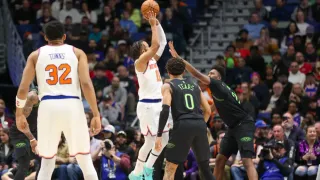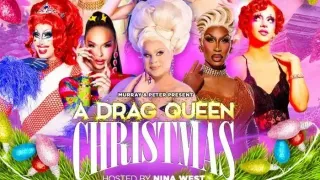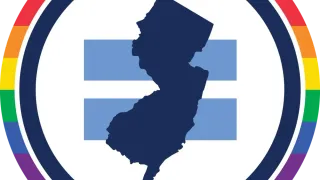June 6, 2016
Fascinating People :: Chris Clayton
Kilian Melloy READ TIME: 20 MIN.
Now that I've finished a fourth series of eighteen original short stories with a "Twilight Zone" edge, it's time to turn back to political and social commentary, along with some arts and entertainment columns.
While the 2016 elections have offered no lack of juicy material, though, I'd like to start back on the "Fascinating People" series of interviews. You might recall that just after the second series of short stories concluded I interviewed Tom Elliott, who runs two podcasts from a site called Gentlemen's Grindhouse Radio. Even then, I knew I would want to follow up with an interview featuring Tom's partner in podcasting crime, Christopher Clayton.
Chris and Tom co-host a podcast called "The Strange and Deadly Show." Each of them has had solo podcasting projects in the past -- Tom Elliott also produces "The Twilight Zone Podcast" and has been the longtime host of the site's flagship program, "The Gentlemen's Grindhouse," in which Tom and others talk about horror move. Chris used to produce "Goreboy Radio," dedicated to horror movies. Together, the duo's new project examines selections from the UK's notorious "Section 3 Video Nasties" list, with each episode pairing two films with similar themes.
The episodes thus far have ranged from mainstream classics like "John Carpenter's The Thing" to "The Texas Chainsaw Massacre" and the original "Friday the 13th" movies to more rarefied finds like "The Erotic Rights of Frankenstein" and "The Mad Foxes." It's a real grab-bag: You can sort of understand why government censors might target films with titles like "The Love Butcher" or "Honeymoon Horror" (out of defense of good taste if not public morals), but "John Carpenter's The Thing?" Or even the original version of "The Hills Have Eyes?"
Chris and Tom are fearless in viewing, researching, and discussing these films on the air. In many instances, you come away grateful that they have investigated a pair of films that, thanks to their fortitude, you don't have to. In some cases, of course, the result is a surprising treasure among the fluff and detritus -- "Foxy Brown" deserves to be remembered, and so, too, does the improbable semi-vampire movie "Martin." More often, however, the hosts of "The Strange and Deadly Show" laugh along with the listeners even as they express bewilderment, disgust, or contempt for well-forgotten flicks like "Zombie Oasis."
But the movies are only half the fun. While Tom Elliott is more reserved, Chris Clayton is the stew's hot pepper of innuendo, inventive trash talk, and ribald badinage. Their temperaments blend quite nicely, and they make even the most tiresome and indefensible cinematic trash on the list the subject of their always-amusing discussions.
There's plenty more to say, but why not go to the source for the inside scoop? Dear readers, here he is: The fascinating Chris Clayton!
EDGE: First off, you have been a podcaster for some years now, and from the sound of your fluent and relaxed style on "The Strange and Deadly Show," it's become second nature. What got you into podcasting? How did you know this was your art, so to speak?
Chris Clayton: Well, thank you! That's kind of you to say. I don't think most people would describe my style as relaxed! I have a very long history with podcasting, firstly as a listener and later as a creator. I really got into radio when I was a teenager, and I'd spend hours listening to LBC - the London talk radio station. I think that's where my love of speech came from. I loved the idea that these presenters could hold court over a number of hours, and they'd have to generate the content purely through speech. Phone calls from listeners would obviously help in generating topics, but they'd still need charisma and intelligence to keep the conversation going.
Later on I transitioned into podcasts with some of the stuff Frank Edward Nora was doing. His show "The Overnightscape" was really one of the first long-form podcasts on the internet, and he'd just walk around New York on his trip to work discussing the things he was seeing or, come to think of it, really any topic he felt like discussing. I was really impressed by how he was able to keep going purely on his own. He created his own energy and fed off of it without the need for anyone else, though he'd have guests sometimes too. "Deadpit Radio" was an influence, being perhaps the first radio-formatted horror podcast (which they called "horror talk radio"). I loved the format of that and the hosts, and they continued for many, many years, only ending the show very recently due to a lack of news/excitement about horror.
As for how I knew it was my art... I'm still not sure podcasting is! There's a lot of things I really want to do, including writing. That said, it's an art I feel comfortable with and I'm generally happy with what I've done so far, flaws and all. I knew I'd be good at it because I spent a lot of time growing up on my own, without many friends. I was bullied a lot, so I spent a great deal of time alone and I simply learned how to converse with myself. If you listened to my solo shows, you'd have heard the by-product of that - me chatting with myself, but also involving the listener too. It seemed to work.
EDGE: What is it about podcasting that makes it the chosen form (and forum) of so many people -- including all too many who, not to throw shade, but just don't have the kind of charm or presence you and Tom have? Also, I have a sense podcasting is more a "Millennial" pursuit than something older people get into -- am I wrong about this? Is it a young person's game?
Chris Clayton: I presume when you said 'charm' you meant Tom! He's the charming one. As for whether it's a "Millennial" pursuit, I don't really think that's true. Perhaps there's a perception that it's a young person's hobby, but I've heard all sorts of podcasts presented by people with a wide range of ages. I really strongly believe in anything creative being accessible to anyone. I think it'd be genuinely awful if podcasting was considered something that only young people can do. If you can buy yourself a decent microphone and work out a few basics of recording, you can absolutely record a podcast. That's my belief. It should be an ageless pursuit.
As for what you brought up concerning what Tom and I do in comparison to others, I'd imagine that's more a case of personality and what you can bring to a show, rather than age. If you're a bit boring, you're going to be boring whether you're 23 or 63. That said, there's probably a place for you in podcasting even if you are boring. There's always something you can do that fits into some sort of niche.
EDGE: The theme of your previous podcast, "Goreboy Radio," was horror films. Why horror? What's the appeal there for you and for other horror fans?
Chris Clayton: It was just instinctual for me to make Goreboy Radio a horror show. It's a subject I enjoy talking about, and while I can't claim that I keep up with a lot of modern releases, I'm a big fan of horror from the 1930's onwards. If you know a good amount about a subject, that tends to be what you'll pick to podcast about. I've been a horror fan since I was a kid. I've told the story a bunch of times, but I vividly remember being a kid and watching John Carpenter's "Halloween" with my parents. They'd let me watch it, but any time something violent happened I'd get a cushion promptly stuck to my face so I couldn't see it! This worked wonders in stopping me from seeing anything grisly, but of course what it didn't do was block out my imagination. A child's imagination is about as fertile as they come, so I'd often fill in those blank spaces with something far more horrific.
To be honest, I firmly believe that I got into horror simply because I was initially afraid of it. I remember taping "A Nightmare on Elm Street" Parts 1 and 2 off of Sky TV when I was young, and I then watched them both back-to-back. I was scared of Freddy Krueger, and I felt like I could get over that if I exposed myself to those films. I did so and pretty much became a horror fan from that point onwards. I'd say that the appeal for me is that there's such a rich vein of creativity in horror that doesn't exist in other genres. There's a lot of magic in those practical effects. Horror movies were frequently produced on a low-budget, so there was something great about seeing directors pulling something awesome together with very little money available.
I think a lot of the appeal for horror fans in general is knowing that we're considered the black sheep of the film industry. People turn their noses up at horror all the time. This is a special little club, comprised of really passionate people who tend to love films that aren't part of the mainstream.
EDGE: You are also a fan of martial arts films and -- or so I am assuming -- science fiction. What attracts you to these genres, which to often are looked down upon by people who like to think of themselves as "serious" or "true cineastes?"
Chris Clayton: To be blunt, I couldn't give a damn what "true cineastes" think. If you want to spend your life peering away at art films and looking down your nose at people like us, that's your business. They've a right to it of course, but I personally don't leave room for pretentitious people in my life. What a bloody boring life that is, avoiding the enjoyment of a fun genre film because you're too busy hoping you'll be noticed for your super-serious take on fil-ummmms. Life's too short, it really is.
Yes, I am a huge fan of martial arts movies! That's another one that goes right back to my childhood. I wish I could remember the precise moment that the bug got me, but I can tell you that Bruce Lee and Jackie Chan were the major influences. I'm fairly sure that the first kung fu movie I ever really loved was "Enter the Dragon," and Bruce became a huge hero of mine. This was another genre that I came to read a lot about, much like horror. I wanted to know more and more about it. I drank in as many kung fu movies as I possibly could as a kid and through my teenage years, often picking up dodgy VHS tapes with badly-dubbed old movies on them.
As for sci-fi, that was another very natural genre for me. I love fantasy, and the usage of imagination. "Star Wars" was and still is hugely important to me, right from an early age and moving forward. "Star Trek" less so, but I still very much enjoyed it. I'm just a huge fan of creative, interesting stories and sci-fi has so many of those. "Blade Runner" is a huge favourite of mine.
EDGE: Let's chat a bit about your current project, "The Strange and Deadly Show." This is a podcast that explores, in depth, the titles included on the infamous Section Three "Video Nasties" list. I know what this is (more or less) from having heard your on-air descriptions in the past, but lest I get it all wrong in trying to explain it to American readers, could you give a quick explanation of what the Section Three and Section Two lists were?
Chris Clayton: Sure.
There's a very, very long history to the Video Nasties. Chris Brown (not that one) wrote a very good book, and also recorded The Video Nasties Podcast, and those are good resources if you're looking for in-depth information on exactly what the whole movement was. The Section 2 list was comprised of many films that were collected together by the British government, some of which were prosecuted and some of which were not. Police conducted raids on video shops and private collectors to confiscate those films. Many infamous horror movies were part of that list, with the BBFC releasing some of them with many cuts to reduce the levels of graphic gore or what they deemed to be offensive material. Many of the films are actually pretty tame by today's standards, but there are classic ones in there - films like "Cannibal Holocaust," "The Evil Dead" and "Tenebrae," to name just a couple. Think of it as a bunch of executives trying to tell you what you can and can't watch, simply because it sounds offensive to them, irrespective of whether they watched any of the films or not.
The Section 3 list is another collection of films that were never prosecuted, but they were still able to be confiscated. You might think of them as 'lesser' Video Nasties in terms of reputation. The list is actually quite diverse, with all sorts of films on there that vary in genre. "The Strange and Deadly Show" was initially planned as a Video Nasties podcast, but once we learned that Chris Brown was going down that path with his own podcast and book we settled on Section 3 instead. Section 3 hasn't been covered extensively and never really in podcast form, so we realised there was a gap in the market and we popped right on in there. It gave us a clear goal because there's a finite amount of films on the list, and it seemed like a project we could really get invested in.
EDGE: Do you have a sense of why anyone thought the Section Two and Three lists were necessary? I know on the show you sometimes puzzle over why certain films were included, but does the very existence of those lists make any real sense?
Chris Clayton: It's never made any sense to me whatsoever, but then I'm not a fan of censorship at all and that's entirely what this was. Just a bunch of very stuffy, ill-informed people thinking they should be the arbiters of taste. Video Nasties was a sour, poisonous part of the history of film in Britain, and we were poorer for it. Nobody should ever tell you what you can and can't watch, with reasonable exceptions of course. If you're a parent, it's your responsibility to manage what your children watch. That's not censorship, that's being a responsible parent. Don't blame the content itself, blame parenting. A lot of the bluster around Video Nasties was focused on the idea that kids could see those films. Well, firstly, don't LET your kids see them, but also realise that if you ban anything it instantly becomes way more attractive. The British government only succeeded in creating a reputation for the films.
Sadly, it's still happening with video games. How often do we get articles about the violence in video games and how they influence people to do harm? It's just simply not true. There aren't people out there waiting for some sort of media to flip the crazy switch in their brains. If you're going to kill someone, you were predisposed to do it long before you ever touched a horror movie or a violent video game, in my opinion. Don't ban "Grand Theft Auto," for example, just because your kid is playing it and there's violence and sex in it. That's up to the parents to control that carefully. Most of us are pretty decent, respectful human beings and we want the RIGHT to watch/play/read what we desire. I've never liked the thought of someone else coming in and wrestling that control away from me.
Let's not forget of course that Mary Whitehouse was a huge part of the Video Nasties movement, and she never saw any of the films she was protesting against. Well done love!
EDGE: I say those genres get looked down upon, but listening to your show -- which always features loads of research, well-written recaps, and endless fascinating deconstruction and analysis -- I really do feel I'm hearing a scholarly take on the material, although a really fun one. Is there a serious undercurrent or intention behind the podcasts you've done? Are you contributing to a cultural conversation, as it were?
Chris Clayton: I don't believe we intend on offering a scholarly analysis of the films. We've always wanted it to be entertaining, first and foremost, but of course we also want to come across intelligently. I'd say that based on listener numbers and feedback we're not contributing to the kind of conversation you mentioned. I think it's just a fun horror podcast. Many of the films are pretty obscure, so I don't know if what we're doing is adding much to the history or reputation of them. Perhaps what we're doing is helping a few folks to discover some films they've never heard of, and I know that some people have subsequently found copies of them. There's a couple of gems we've happened upon as we go through the list and we pass the savings on to you! If we're adding anything, I'd say we're giving people a little taste of those and offering a recommendation that they can choose to check out if they so desire.
Someone like Jim Moon (Hypnogoria) is a better choice if you want that scholarly feel, with oodles of research behind it. He's also very funny and entertaining, but I'd say he contributes more meaningfully to that conversation than we do. I reckon his stuff will be remembered. I'd love to think that ours will be too, but I'm just proud that I've gotten to work with Tom and we've produced some content we're proud of. It's for others to decide if it has any lasting appeal.
EDGE: Let me compliment you on how good your show sounds and how professional it is in every respect, from the art at the site to the editing to the into and outro music... especially the music, which is absolutely first rate! How did you and Tom pull together such excellent production values?
Chris Clayton: As far as "Strange and Deadly" goes, 90% of it comes from Tom. He owns the site, sought the great DarkInc1 for the artwork and Danny Davies for the music. He publishes the shows as well. He's someone who enjoys a polished show, being a fan of old radio shows and podcasts himself. So a lot of the presentation was handled by him. Gentlemen's Grindhouse Records is really his baby. Obviously when I was doing "Goreboy Radio," that was all me. Tom and I are both leaders really, but we've been able to compromise and work together. I'd love to say that "Strange and Deadly" is 50-50, but he does a lot of the stuff that makes it look pretty and actually ensures it reaches your ears. I come in with the research, I write all of the notes (except for some bits that Tom might write himself while watching the film) and the synopsis for each film. I do as much as I possibly can, but you still wouldn't hear this particular podcast if it wasn't for Tom.
As for the sound of the show, I'm a bit of a perfectionist. I've had to let some of that go because it's difficult to get every second of every show exactly the way you want it with two people involved. We both know what sounds good, which helps. I've heard a lot of terrible-sounding podcasts, with bad edits and awful sound quality. So I heard a lot of those mistakes before I ever even started putting shows together myself. I really loved the idea of crafting and mixing when I was doing my solo stuff, and I think even Tom would admit he learned a bit of that from me. We combine those skills together with this show, as we take it in turns to edit. I'll edit one show, he'll edit the next. We record via Skype but we only use the Skype track as a guide. We actually record locally on both sides, and we use the Skype track to sync our two lossless local tracks up so that they match the Skype one. We then discard the Skype track and edit using our local tracks. That's why it never sounds like we're speaking over Skype - the show you're hearing is both of our local tracks synced up together, rather than a bad-quality Skype track.
I've always loved the sound of a good radio show, with intro and outro music, and proper segments too. We love a bit of production, even though we keep our show a little simpler. My "Goreboy Radio" shows were absolutely packed with tracks, from musical beds to samples. So complicated! It took absolutely ages to get a show finished, and I was ruthless in making sure I made the whole thing sound good. It had to flow well and sound smooth.
EDGE: Despite the high quality of your show, not everyone is always best pleased with it. I recall how, in one episode, a listener questioned your "commitment" to in-depth and serious examination of the films in question, and you gave him quite the on-air varnishing. You and Tom both point out from time to time how podcasting isn't lucrative, and it's a huge demand on your time that isn't always easy to fulfill, given your busy lives. Obviously, it does take huge commitment to take on a project of forty-some episodes and fill in a relative blank spot in the cultural and cinema-lovers' landscape. So -- given you're getting zero dosh and the occasional bit of stick from an ungrateful public -- what makes this project worth it to you?
Chris Clayton: We've been pretty lucky to have avoided negativity, for the most part. We've had one extremely negative iTunes review from someone who was chiefly attacking me, but I've never taken that as legitimate criticism of our show because it was written with an agenda in mind and was the result of a nasty exchange on Twitter. Nasty from that person's end, not mine I hasten to add. The other person you spoke of is someone who seemed to enjoy what we do until we spoke negatively about a film he liked, at which point his comments started turning a bit sour and we stepped in to talk about it. I'm not proud of making that person cease listening to us, but you've got to stand up for yourself.
The truth of the matter is that many people dislike the idea of having something they like or love criticised. They're happy to groove along with you until you push their button, and then suddenly they attack you. We'd never even dare claim that our opinions are in any way, shape or form 'definitive'. They're simply our opinions, nothing more than that. It's hard sometimes to hear someone really laying into something you love, and I know that from experience, but you've got to shake it off. Try to realise it's someone else's opinion and it shouldn't stop you from enjoying it. Now, saying all this, I'm implying that we're always negative. We seem to have that reputation, but we call it as we see it. Much of it is instinct; what it feels like to us personally. We've loved a bunch of films on the list.
As for what makes it worth it, I'd say that much of the appeal for me is working with Tom. We have an interesting chemistry. We're both very, very different people, but we seem to gel pretty effortlessly and it's a joy to discuss the films with him. The other thing that makes it worth it is the fan feedback. We've kind of locked down a core group of feedbackers, and while I'd love to see that expand, I think we're best to be content with the cult audience we do have. Hearing that people love the show, and reading some of the iTunes reviews too, all that stuff really makes you feel you can power on through.
EDGE: One of the real pleasures of listening to The Strange and Deadly Show is your repartee with co-host Tom Elliot. You needle Tom quite a lot, but it's obvious there is a lot of affection and respect there, which gives the show a warm and friendly feel. But I do wonder whether its ever the case you go a bit far and Tom says, "Okay, that's enough," and you have to edit that out of the finished show.
Chris Clayton: Firstly, anyone reading this needs to know that Tom could crush me into dust with his pinky finger. He's a strong and powerful man, and I think I'm a little bit afraid of him. Actually, no, I definitely am. Believe me when I tell you that nothing I say could hurt him as much as he could hurt me with his mighty might.
That said, I can honestly say that we've never cut anything I've said to him. He's an easy-going guy, and he's always understood that it's banter. Many times he's encouraged that banter. Tom is easily the most loved of the two of us. That voice of his has gained him a whole lot of followers, so I like to prod at him (in a non-weird way) as a way of reminding people that he's human. As am I. He's just a nicer-looking, more talented human. I've always told him that if he's ever uncomfortable with anything I've said he must tell me, and so far that hasn't happened. We've occasionally cut some bits out that might be a bit too offensive about the films or other people, or bits that maybe didn't come out as well as we'd hoped, but never exchanges between each other.
EDGE: A listener once came up with the formulation that "Tom is the class, and Chris is the ass" as a way of characterizing your different personalities and roles on the show. I have to say, I really like Tom's sober and thoughtful commentary on "The Strange and Deadly Show" (and also The Twilight Zone Podcast), but your funny, fast, lighting-like (and often quite profane and hilarious) spiel gives "The Strange and Deadly Show" a real zing! Do you just start talking extemporaneously and let the bon mots fly? Is some of what we hear scripted in advance (other than the recaps and trivia sections)?
Chris Clayton: Hmm... I'm not sure I wanted to be the "ass" really!
Most of what you hear isn't scripted except for, as you say, the synopsis of each film and some of the various trivia bits, although we don't really do the latter any more as we wanted to cut the length of the shows down by stripping away needless parts. We might happen upon a bit that one of us has started and we haven't quite nailed it, so we'll remember what we said and repeat it again to get the bit spot on. For the most part what you're hearing when I'm going off is genuinely the way it was. The podcast-me is partly a persona. It's me, and the opinions are mine, but I embellish and react differently than I would in real life. So sometimes I'm throwing everything at the wall and I'm improvising, and that's what you hear captured on the recording. I'm not some sort of genius comedian - I actually don't think I'm very funny at all - but I do know how to riff a little. You'd be surprised at how calm and polite I am when I'm not recording!
EDGE: A more personal question, which you are free to disregard if you want -- You've spoken on air from time to time about suffering from depression. First off, thank you for your brave and public disclosure. It's so easy for people who struggle with depression, anxiety, and other emotional health issues to feel that they are alone and isolated, and to hear a friendly, familiar voice come out and say, "You know what? I struggle with this, too, and you aren't alone" is a huge relief and an inspiration. That's what I have to say to you about it -- have you heard much from other listeners responding to what you've had to say on the issue?
Chris Clayton: I don't mind answering it, as it's become a big part of my life. I can't ignore it any longer. I've had to acknowledge it, and I really don't mind being honest because I've come to learn that other people suffer from it too.
I've been very lucky actually to hear from a bunch of listeners, privately, who have suffered from depression. Their words have most definitely helped, and the "Strange and Deadly" listeners have been pretty damn supportive. I don't like to include a lot of my personal life on the shows, but we've had to take breaks we never wanted to take during the life of the podcast and some of those are because of me. Not all, but some. I can definitely concur that hearing "You are not alone" is extremely helpful, because depression makes you feel isolated. You feel you're the only one suffering from it, that you're in your own little box.
I've realised that this is a battle I'll be fighting for the rest of my life, but I'm doing what I can do to make the times in-between those down periods longer and longer. There's much work to do and much lies ahead of me, but I'll never give up fighting that fight. Having a goal in mind is tremendously helpful too. No matter what happens, we're going to finish the Section 3 project and then we'll see where it goes from there. I won't let the depression prevent us from doing that.
EDGE: You and Tom are about halfway through the Section Three "Video Nasties" list, so you'll be at it for another couple of years probably. But are you already kicking around ideas for other podcasts? And also, would another co-hosted podcast, with Tom or with anyone else, be something you'd want to do, or do you think you would rather go back to a solo podcast?
Chris Clayton: We certainly have been, although nothing has been set in stone. The priority is to finish the Section 3 list, get those films covered completely. We're not sure what lies beyond that. We have considered the possibility of "Strange and Deadly" continuing after Section 3 (we named the show something non-specific for a reason!) with another subject entirely, so that could happen. There's another idea we've talked about too, which would see us continue working together. I can assuredly tell you that I don't wish for any other co-host. It's quite rare to find good chemistry any way, but I can't ever see myself podcasting with anyone except Tom.
As for a solo show, that is definitely in the pipeline. As for what it'll be, I can't really say. I've got an urge to do something really interesting and creative, and there's also a martial arts podcast that I've been desperate to do. I just don't have anything quite nailed down at this point. Sometimes I wonder if I even want to continue in podcasting at all. I weave in and out of it on occasion. I'm pretty confident though that there will be more podcasts to come in the future, either from the both of us or the two of us seperately. Don't you worry!






